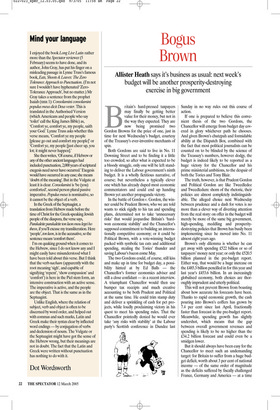Mind your language
I enjoyed the book Long Live Latin rather more than the Spectator reviewer (5 February) seems to have done, and its author, John Gray, has put his finger on a misleading passage in Lynne Truss’s famous book, Eats, Shoots & Leaves: The Zero Tolerance Approach to Punctuation. (I’m not sure I wouldn’t have hyphenated ‘ZeroTolerance Approach’, but no matter.) Mr Gray takes a sentence from the prophet Isaiah (xxxx 1): Consolamini consolamini populus meus dicit Deus vester. This is translated in the Authorised Version (which Americans and people who say ‘toilet’ call the King James Bible) as, ‘Comfort ye, comfort ye, my people, saith your God.’ Lynne Truss asks whether this verse means, ‘Comfort ye my people [please go out and comfort my people]’ or ‘Comfort ye, my people [just cheer up, you lot; it might never happen].’ She then writes, ‘Of course, if Hebrew or any of the other ancient languages had included punctuation, 2,000 years of scriptural exegesis need never have occurred.’ Exegesis would have occurred in any case; she means ‘doubt of the meaning’. But in the Vulgate at least it is clear. Consolamini is ‘be (you) comforted’, second person plural passive imperative. Populus meus is nominative, so it cannot be the object of a verb.
In the Greek of the Septuagint, a translation from Hebrew made before the time of Christ for the Greek-speaking Jewish people of the diaspora, the verse says, Parakaleite parakaleite ton laon mou legei ho theos, if you’ll excuse my transliteration. Here ‘people’, ton laon, is in the accusative, so the sentence means ‘comfort them’.
I’m on quaking ground when it comes to the Hebrew, since I do not know any and I might easily have misunderstood what I have been told about this verse. But I think that the verb nacham (apparently with the root meaning ‘sigh’, and capable of signifying ‘repent’, ‘show compassion’ and ‘comfort’) is here in the Piel stem form, an intensive construction with an active sense. The imperative is active, and the people are the object. That is the same as in the Septuagint.
Unlike English, where the relation of subject, verb and object is often to be discerned by word order, and helped out with commas and such marks, Latin and Greek make their syntax clear by inflected word endings — by conjugation of verbs and declension of nouns. The Vulgate or the Septuagint might have got the sense of the Hebrew wrong, but their meanings are not in doubt. The fact that the Latin and Greek were written without punctuation has nothing to do with it.
Dot Wordsworth
































































 Previous page
Previous page